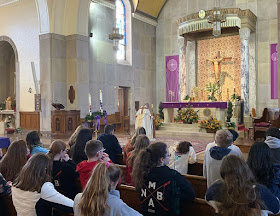By Sr. Natalie Sayde Salameh, MSCL
The MYO Adore Retreat for northeast region of the Eparchy of St. Maron was on December 13–15 at the Wisdom House retreat facility in Litchfield, Connecticut. Sister Therese Maria, eparchial director for youth, the Maronite Servants' sisters, and seminarians planned a dynamic weekend centered on the example of St. Joseph and how he can inspire us in preparing our hearts to welcome the birth of Jesus.
In attendance were 100 teens and advisors from several parishes: St. Maron’s in Philadelphia; Our Lady Star of the East in Pleasantville, NJ; St. Theresa’s in Brockton, MA; Our Lady of Purgatory in New Bedford, MA; St. Anthony’s in Lawrence, MA; St. Anthony’s in Danbury, CT; Our Lady of Lebanon Cathedral in Brooklyn, NY, and St. John Paul II in Sleepy Hollow, NY.
We were especially blessed this year to have among us His Excellency, Bishop Gregory Mansour, who gave a talk to the teens on the silence, purity and prayerfulness of St. Joseph on Saturday morning. Also, Fr. Dany Abi-Akar, pastor at St. John Paul II in Sleepy Hollow, presented on the obedience of St. Joseph.
Over the weekend, the teens participated in a variety of events, activities and prayer which included Eucharistic Adoration and confession. Sr. Therese Maria faciliated a Q&A panel of speakers which included Fr. Dany Abi-Akar, Seminarian Vincent Michael, Vivian Akel from the eparchial office of child protection, Mother Marla Marie and Bishop Gregory Mansour. The teens asked a variety of good questions including vocational and the teachings of our Catholic faith.
Many of the youth expressed their joy at having made new friends, having an opportunity to bond with God and one another, and at being free to just be themselves and have fun. One of the icebreakers which generated much excitement was the “Santa Beard Relay”, where the youth were divided into 6 teams, and with Vaseline-smeared faces had to dunk them into a tray of cotton balls to see how many would stick.
 Our retreat concluded on Sunday morning at the Divine Liturgy at St. Maron’s Church in Torrington, followed by brunch. A special thankyou to the entire team of advisors and volunteers who generously donated their time, talents and treasures in making this retreat such a special event. A special thank you as well to Fr. Tony Saab and the parish of St. Maron’s for their gracious hospitality.
Our retreat concluded on Sunday morning at the Divine Liturgy at St. Maron’s Church in Torrington, followed by brunch. A special thankyou to the entire team of advisors and volunteers who generously donated their time, talents and treasures in making this retreat such a special event. A special thank you as well to Fr. Tony Saab and the parish of St. Maron’s for their gracious hospitality.
























